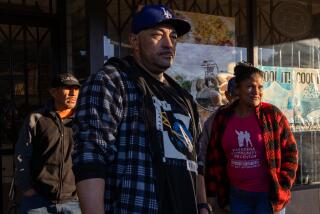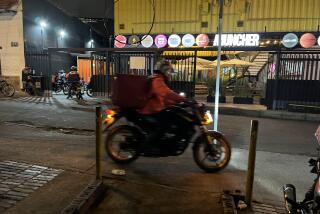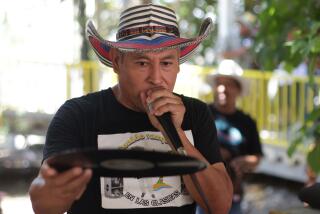Citizen Patrol Fills Void Left by Colombian Government
- Share via
BOGOTA, Colombia — Jose Rivera hates the smell of burning tar, but he likes change in his pocket--and motorists tip generously for someone willing to fill any of the 4 million potholes on Bogota’s crumbling streets.
In a country notorious for shoddy or absent basic services, many Colombians earn a living doing the work not done by an inefficient government.
They provide makeshift phone services, clean the streets of recyclable garbage and even direct traffic for tips.
Rivera and his partner each can make the equivalent of $150 a month, or slightly more than the minimum wage, in tips from passing motorists pleased by their filling of potholes.
It’s a badly needed service in a chaotic capital of 7 million people snarled by overwhelming, poorly managed traffic and pockmarked roads. Some potholes are big enough to climb into and many remain unfilled for years.
Rivera and his partner are not out to save the city, but they don’t see anything wrong with profiting from a problem they didn’t create.
“This is not the way to become a millionaire. We just make enough to eat, and at the same time we’re doing a service,” says Rivera, black from the smoke and tar burning by the side of the road.
All over Bogota, services the government can’t or won’t provide are offered by people without formal employment.
Pedro Huertas, crippled by illness in 1994, sells cellular phone service from a phone attached to his wheelchair. People tired of searching for a working public phone--or waiting in line when they do find one--pay Huertas $1 for two minutes of phone use.
“It’s hard to find a public phone that works at all in this town,” Huertas says. “People just love the service. Everybody uses it.” His phone can also call cellular phones, which city public phones don’t.
Enterprising workers can be hired to wait hours in serpentine lines to pay utility bills. At busy intersections downtown, men direct traffic for tips in the absence of police. An army of recyclers patrols the streets for garbage they can resell because the government has no formal recycling program.
The phenomenon is common in many developing countries, says Maria Rosario Sabedra, a sociologist at the Jesuit study center, CINEP.
“Colombians are very creative. It’s a question of survival,” she says. “People are used to living on the margins between legality and illegality.”
Mayor Antanas Mockus, however, says the ingenuity doesn’t do much to solve unemployment in a country where 12% of working-age people do not have jobs. And that kind of work doesn’t produce any taxes for the city’s underfinanced budget--and can end up costing the government more in the long run, he contends.
“To send trained technicians to refill a pothole the freelancers filled badly costs us more” than filling it right the first time, he says.
Mockus has led creative campaigns to encourage civility, such as hiring hundreds of teenage mimes to mock people who jaywalk or act brutish behind the wheel. But he has also cracked down on street vendors he says add to crime and take business away from legitimate shopkeepers.
Still, in a city as chaotic as Bogota, the government can do little to stop people from making a living in unorthodox ways.
Mario Caicedo, who sells 80 cents’ worth of change for a dollar, bristles at suggestions he’s taking advantage of people who need coins for a bus or public phone.
Until September, he was working in Bogota’s sewers for minimum wage. Now, he can make three times more just sitting near a bank of phones along one of the city’s main bus routes.
“This is my job. It would take me a week in the sewers to make what I make in just a couple of days here,” he says. “I’m not stealing from people. It’s just a question of supply and demand.”
More to Read
Sign up for Essential California
The most important California stories and recommendations in your inbox every morning.
You may occasionally receive promotional content from the Los Angeles Times.













